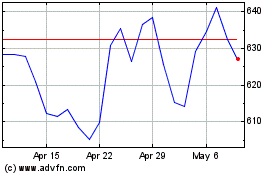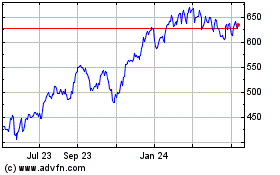Self-Employed? Taxes Just Got Easier
March 24 2016 - 8:30AM
Business Wire
QuickBooks Self-Employed Seamlessly
Integrates With TurboTax Online and Accountants for Worry-free Tax
Preparation
Managing taxes just got easier for one-third of the American
workforce that is self-employed, including the 3.2 million
on-demand workers in the emerging gig economy.
Now with a single click, QuickBooks Self-Employed automatically
organizes and transfers tax documents into TurboTax Online Home
& Business® or to an accountant or tax professional. The
integrated products, both from Intuit Inc. (Nasdaq:INTU), deliver a
smarter, more effortless way for self-employed workers to manage
their taxes at tax time and throughout the year, helping them avoid
surprises and be confident they’re getting every dollar they
deserve.
Self-employed people face a range of challenges when managing
finances: keeping track of multiple income streams, untangling
comingled business and personal expenses and understanding
potential tax deductions. Whether they do their taxes online or
with their mobile device or turn to an accountant, Intuit takes the
pain out of tax preparation.
“The self-employed workforce has been
growing steadily for the past 30 years with a
recent acceleration stemming from the emergence of the
on-demand economy. With the leap into self-employment, these
individuals face new challenges when it comes to financial
management and taxes,” said Alex Chriss, vice president and general
manager of Self-Employed Solutions at Intuit. “Whether you do your
own taxes or have someone else prepare your return, our goal is to
deliver a smart, seamless experience, so self-employed taxpayers
can effortlessly file their taxes and find financial
stability.”
Avoiding the Tax Time Crunch
Self-employed taxpayers can now use QuickBooks Self-Employed and
TurboTax Online Home & Business together to easily track their
business expenses throughout the year, for an effortless tax filing
experience.
When it’s time to file taxes, TurboTax Online Home &
Business automatically imports this information, providing users
with personalized guidance specific to their situation, so they get
every deduction and credit they deserve. The combined benefits of
QuickBooks Self-Employed and TurboTax Online Home & Business
let self-employed workers:
- Put expense and income management on
auto-pilot: Securely connect bank and credit card accounts to
automatically categorize transactions, making it easy to see total
income, expenses and profit.
- Untangle business and personal
expenses: Separate business from personal transactions by
simply clicking a button, or swiping a finger across the mobile
app, instantly categorizing Internal Revenue Service Schedule C
deductions.
- Turn expenses into deductions:
Auto-categorizes expenses – such as mileage, phone bill and
supplies – into the right deduction categories to help freelancers
save on taxes. On average, users identify $18,217 in potential
deductions.
- Estimate quarterly and year-end
taxes: Shows freelancers if they need to make quarterly tax
payments, providing insight into their real income and helping them
budget appropriately.
- File faster by exporting Schedule C
to TurboTax Online Home & Business: Pay quarterly and
year-end taxes with the click of a button through seamless
integration with TurboTax Online Home & Business. Schedule C is
automatically populated and then exported to TurboTax Online Home
& Business.
In addition, for those self-employed individuals who work with a
tax professional, sharing important tax documents is as easy as
clicking a button with QuickBooks Self-Employed. The product does
all the heavy lifting for them by compiling all sorted income and
expense entries into a comprehensive tax detail report, saving both
them and their tax accountant valuable time at tax time.
Tax Tips and Deductions for the Self-Employed
Here are six tax-saving tips that may assist first-time
self-employed taxpayers.
- Startup costs: Newly formed
businesses may be able to deduct startup costs, including legal
fees, cost of experimentation and advertisements.
- Vehicle expenses: In addition to
the mileage deduction and other expenses, self-employed may be able
to deduct the cost of their car up to $25,000 for cars and
SUVs.
- Home office deduction:
Self-employed workers with a dedicated space used only for business
in their home can deduct a percentage of their home expenses,
including mortgage payments, utilities and property taxes.
- Supplies and
equipment: Office supplies, from paper to computers – even
snacks for customers – may be deductible if used exclusively for
business.
- Social Security and Medicare
taxes: Self-employed workers must pay the entire 15.3 percent
Social Security and Medicare tax, but get a break by writing off
half of what they pay.
- Health insurance premiums:
Self-employed workers may be able to deduct what they pay for
medical insurance for themselves and their family.
More information on tax tips and deductions is available on the
TurboTax blog.
About Intuit Inc.
Intuit Inc. creates business and financial management solutions
that simplify the business of life for small businesses, consumers
and accounting professionals.
Its flagship products and services include QuickBooks® and
TurboTax®, which make it easier to manage small businesses
and tax preparation and filing. Mint.com provides a fresh,
easy and intelligent way for people to manage their money,
while ProSeries® and Lacerte® are Intuit's leading tax
preparation offerings for professional accountants.
Founded in 1983, Intuit had revenue of $4.2 billion in its
fiscal year 2015. The company has approximately 7,700 employees
with major offices in the United States, Canada, the United
Kingdom, India and other locations. More information can be found
at www.intuit.com. Intuit and the Intuit logo, among others, are
registered trademarks and/or registered service marks of Intuit
Inc. in the United States and other countries.
View source
version on businesswire.com: http://www.businesswire.com/news/home/20160324005404/en/
Intuit Inc.Ashley McMahonAshley_mcmahon@intuit.comStephen
SharpeStephen_sharpe@intuit.com
Intuit (NASDAQ:INTU)
Historical Stock Chart
From Mar 2024 to Apr 2024

Intuit (NASDAQ:INTU)
Historical Stock Chart
From Apr 2023 to Apr 2024
